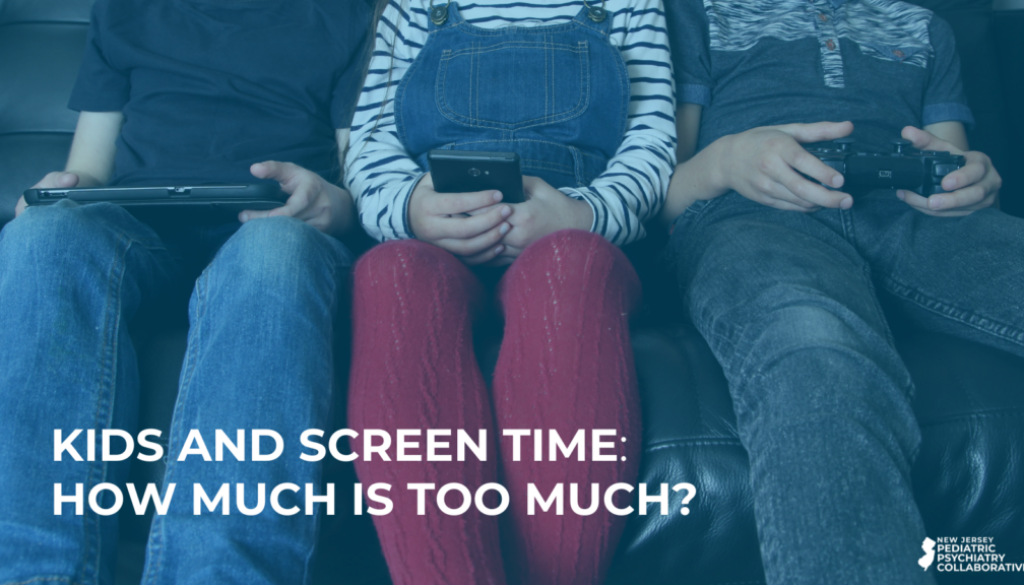Kids and Screen Time: How Much is Too Much?
By Saranga Bhalla, DO
If you feel your child is always on their phone, you are not alone. As a child psychiatrist, parents often ask about their child’s electronic device use and the amount of screen time that should be allowed. Screen time is a subject of ongoing research and debate. Professionals agree there are benefits to screen time: educational, social, and entertainment to name a few. It allows opportunities to connect with others and find a peer group that may not have been possible. However, excessive use can have negative impacts on development and physical and mental health. Researchers like NYU professor Jonathan Haidt have found links between early smartphone and social media use and declining mental health in teens. Since 2012, the same year smartphones and social media hit mainstream use, rates of anxiety, depression, and self-harm among teens, especially girls, have increased significantly. Haidt argues that delaying smartphone access is one of the best ways to protect kids’ mental health during critical developmental years. So what are the current recommendations and guidelines?
The American Academy of Pediatrics (AAP) recommends screen time should be avoided in children younger than 18 months old except to video chat with family or friends. Children from 18-24 months old, if allowed to use digital media, should watch/engage in high-quality content and parents should watch/engage simultaneously to help their child understand what they are watching. Screen time for children from 2-5 years old should be limited to 1 hour/day with active parental engagement. For children older than 6 years old, limits should be placed on when screen time is used and should not interfere with sleep, physical activity, or other health behaviors.
For older children, it is harder to limit screen time since they use computers for school work and electronic devices for social purposes. The American Academy of Child and Adolescent Psychiatry (AACAP) recommends prioritizing a balanced, mindful approach to screen time, integrating both practical guidelines and emotional considerations into their parenting strategies. Below are some practical ways families can manage their teenager’s screen time use in their homes.
Establish screen time limits: For example, no phones allowed during dinner time or no phones allowed while sleeping. The latter is especially important as phone use at night can interfere with the quality of sleep and poor quality of sleep is associated with poorer mental health.
Prioritize content and quality and not just quantity: What your teen is watching is important! Know what they are engaging in on their devices. Dr. Lisa D’Amour, a child and adolescent psychologist, recommends being curious about what your teen is watching and asking questions about what they like or dislike about the content they consume.
Model healthy screen use habits: Kids are watching the way their parents use their devices! What we do is as important as what we say! If they see you putting away your phone at dinner, not using your phone while driving, and prioritizing in-person interactions, there’s a greater chance they will adopt similar habits. This non-verbal communication is powerful.
Set consistent and realistic rules: For younger children, this may include daily or weekly time limits, and for older children, it may include balancing electronic use for school, relaxing, and socializing.
Encourage other activities such as physical activity, creative activities, and in-person interactions. Don’t let screen use replace these activities.
Have regular and frequent conversations about screen time and electronic device use: This allows kids to feel a sense of autonomy and may make it easier to reach agreements if they are a part of the decision-making process.
Monitor for signs of addiction or if screen use begins interfering with normal, daily tasks: If there is academic decline, social withdrawal, and/or they become very emotional when off their devices, you should consult a mental health specialist.
So what’s the take-home message? Screen time, when used appropriately, can have positive aspects and opportunities for learning, creating, and connecting with others if used in a balanced way. Parents should guide children’s screen use and ensure it does not interfere with other important aspects of a child’s development.
REFERENCES:
- Social Media. Jonathanhaidt.com
- Increases in Depression, Self‐Harm, and Suicide Among U.S. Adolescents After 2012. Jean Twenge. National Library of Medicine.
- American Academy of Child and Adolescent Psychiatry
- American Academy of Pediatrics
- 3 Ways you can help your teen manage screen time. Unicef.org
Author Profile:


Saranga Bhalla, DO
Board-Certified Child & Adolescent, and Adult Psychiatrist
Princeton Mental Health, LLC.




